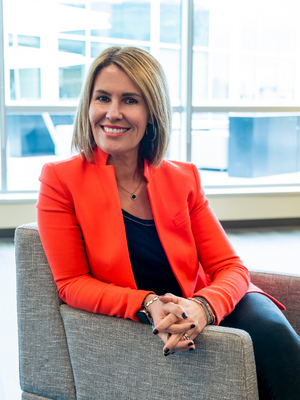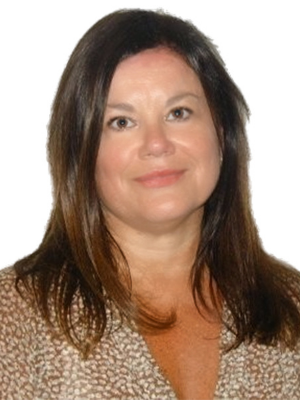 “Getting comfortable with uncomfortable conversations is an ideal way to prepare for a job interview, whether it’s going for a position at a new job or putting your hat in the ring for an opportunity with your current employer,” says Ruth Harper.
“Getting comfortable with uncomfortable conversations is an ideal way to prepare for a job interview, whether it’s going for a position at a new job or putting your hat in the ring for an opportunity with your current employer,” says Ruth Harper.
Harper speaks to the thread that has motivated her all along, supporting women at work and unleashing the opportunities that work can provide.
The Joy Of Empowering Lives
“I witnessed firsthand how the economy can thrive or not, subject to how the world of work works for people or doesn’t. I grew up in a neighborhood in a time when industry was declining, and so there was industrial action and people were out of work, impacting families in a significant way,” says Harper. “My own father had to travel for work. I learned very early about the power of work in somebody’s life, and what happens when you take it away. It’s closely connected to what drives me today.”
Harper grew up in Northern England, an industrial powerhouse, and now lives in Milwaukee, yet another industrial powerhouse. One of the first in her family to go to university and then postgraduate studies, both in human and economic geography, she became a geography teacher – including a stint in the girl’s school once attended by Margaret Thatcher, who became the first female prime minister in the UK.
Curious about what else lay beyond teaching, Harper moved to London and worked with a ‘temp agency’ to figure out how to reinvent herself in work. She was able to transfer her skills to influencing and motivating employment policy, helping unemployed people get back to work and bridging the public and private sectors. It felt meaningful and gratifying, and she was learning a lot while figuring out how to set up public-private partnerships.
“I was working with purpose-driven people who were determined to create opportunities and results that would change people’s lives,” reflects Harper. “The privilege of working on that pulled me into ManpowerGroup. Here I am, 20 years later, still having a nearly first-hand opportunity to create impact. For example, through Manpower’s MyPath program which provides the guidance, support and training people need to build their confidence and employability.”
She notes that while the changing world of work can be exciting, it can be daunting for people in fast-changing industries whose job security feels more volatile: “Being able to address that anxiety and unleash ambition, and to help layout pathways to work for people feels like a thread back to what I could see when I was growing up.”
Supporting Women To Thrive At Work
Harper notes that ManpowerGroup’s Chairman & CEO, Jonas Prising, originally from Sweden, has publicly declared a measurable goal of 50% women in leadership by 2025. Getting familiar with the factors and barriers that can drive women away or block women from the workplace is critical.
“I think organizations need to look at how they help women continue to progress in their career, even when they are part-time or take a break,” says Harper, who spent her own maternity leave in Europe, where she had a year with both of her sons before returning. “Otherwise, we’re never going to get 50% women in leadership because organizations will keep churning out great female talent, who will seek opportunities to balance life and work elsewhere.”
Back in her early days, working in the field of employment policy and government relations with ManpowerGroup, it was not unusual for Harper to walk into rooms full of 55+ year-old white men. They were as likely to assume she was there to take the notes versus contribute to the discussion.
“I learned from a 55 year old male boss at the time to get in there early with a contribution to the discussion. Number one, other people feel relieved and appreciate it when somebody says something first and are likely to even build on it,” advises Harper. “And I learned that contributing early liberates you to relax and enjoy the discussion, because you’re not beating yourself up about not having said anything yet. You may find you are building up to something even bigger to say, but at least you feel good because you’ve contributed.”
She advises the same with networking: “Lots of people don’t love networking. Most people will welcome somebody else walking over to them and saying something; being the first person to put other people at ease is good for you and good for others. It’s a great icebreaker and network builder.”
Navigating Your Desires and Career Journey
Harper likes to surround herself with smart people who bring different perspectives. Curiosity has always pulled her to ask the question ‘what next’. Humility has supported her when she didn’t know that answer.
“Raise your hand, take stuff on and see where it leads you,” advises Harper. “But more importantly, and what I did not always do, is to be confident about articulating where you might want to go, even if it’s not exactly where you might end up, so people have a comprehension of your ambition.”
She encourages women to ask themselves: Am I good with this? Or do I want something different or more? Do I know what that is? How might I get it? Who should I talk to that can help me hone in on what I want?
“Be comfortable with these open-ended questions and then know where your mentors and your people are so that you can have those discussions to help shape your own thought process,” says Harper. “Each person will give you a different set of questions, and that can help you shape a full viewpoint.”
Whether it’s her very supportive husband, or peers inside and outside of the organization, somebody will be able to reflect in a way that helps brings clarity – and sometimes, that means waiting not jumping.
“This is way more of a jungle gym than it is a ladder, so don’t always think that it’s only the vacancy or the opportunity right now that is your opportunity,” says Harper. “Keep going and working it out, until you find or create those opportunities for you.”
Taking On Bigger Leadership Roles
Accordingly, Harper points out that her role of Chief Sustainability Officer did not even exist a couple of years ago.
“There’s nothing more socially impactful than having the dignity to go out and earn a decent living and bring that back to the family and contribute to the community,” says Harper. “At ManpowerGroup, we believe meaningful, sustainable employment has the power to change the world. So, I’m asking how do we, as one of the largest organizations in our industry, set the highest standards and then bring others into that?”
As she’s moved up the ranks, it’s been about “getting out of the weeds” to keep a strategic overview while developing and trusting others. And that means giving people the freedom and safety to do things differently to her (and perhaps even better). “That’s also how I can continue to progress to new and different things – by bringing others with me, so we all rise together and have opportunities.”
Considering herself a talker from a family of talkers, she’s fairly direct in cracking how to get things done. Getting better at deep listening to others, and allowing the pauses in their expression, has been a valuable growth zone.
A mentor of 20 years taught her that leadership style must be versatile and individualized to whoever you are leading. It means both equipping and giving someone the opportunity to run with a project and keeping just enough of an eye to help point them back on track if they are going off-course.
In the spirit of fostering a growth culture at every level, Harper is herself inspired by leaders who are willing to reveal their human side, admit they don’t know something or ask for advice on an idea that is not fully baked.
“I’m really inspired when someone in a senior position puts work in front of me and invites me to build on it, because it shows openness that I might be able to add something to make it even better,” says Harper. “That always motivates me to find really good and constructive input.”
Expressing gratitude at the stage of asking someone to do something, even before they’re delivered (“thank you for…”) is an approach she’s also picked up along the way, showing trust and humility.
Being Purpose-Driven and Making Impact
Harper finds when there is genuine camaraderie in the workplace, people pull together for great things. One of her most humbling and rewarding experiences has been ManpowerGroup’s response efforts to the Ukraine crisis, especially in the Central and Eastern European offices.
“Our Ukraine planning call was the hardest I’ve been on in my 20 years here, but the most inspirational leadership I’ve ever seen, watching people who are really purpose-driven go above and beyond, every day but also on days when it’s needed most,” she says. “And, then how do we continue to do that for refugees or underrepresented groups, too, and find ways to make more impact?”
Recently reflecting on her 20 years at ManpowerGroup, Harper realized she’d moved through many different opportunities and roles, and it hasn’t been a linear journey. What has run through everything is the red thread of getting more people into work and impacting individual lives.
She has two boys, ages 15 and 12, who play American football, soccer and hockey, so being a part of what they love is important to her. She values being present and enjoys traveling, getting outside and good food.
By Aimee Hansen





